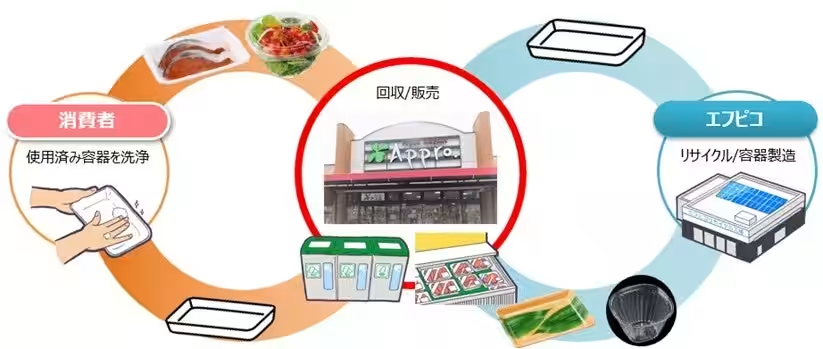

Eco-Friendly Collaboration Strengthens Store-to-Store Recycling Initiative in Japan
Strengthening Store-to-Store Collaboration through Eco-Friendly Practices
In an inspiring initiative aimed at promoting environmental sustainability, Fuppco Co., Ltd. and Kano Co., Ltd. have joined forces to reinforce their collaborative efforts towards effective recycling and the adoption of eco-friendly products. Their partnership targets 53 stores located across Osaka, Hyogo, and Kyoto, collectively leveraging their influence to become local eco-leaders and significantly reduce environmental impact by championing the reuse of food trays.
Fuppco, a leading manufacturer of disposable food containers widely used in supermarkets and convenience stores, has approached this collaboration with the ambition to establish a circular economy in the region. Through a program dubbed "Tray to Tray", used food trays collected from customers at Kano stores will be transformed back into new food trays, which can then be reused again at the stores. This closed-loop system exemplifies horizontal recycling, a term indicating the process of recycling that maintains the original functionality of materials throughout their lifecycle.
The Details of the Initiative
At Kano locations, customers can conveniently deposit used food trays into designated collection boxes. Every tray collected will be processed by Fuppco, helping to repurpose these materials into new eco-friendly products, specifically the brand's eco trays, Eco APET, and Eco OPET. This initiative is designed to not only minimize waste but also promote awareness among consumers about the importance of recycling and sustainability.
During the fiscal year ending June 2025, Kano aims to collect approximately 27 tons of used food trays. Utilizing the recycled materials from these trays in their stores will contribute to a reduction of around 271 tons of carbon dioxide emissions. As part of their ongoing sustainability efforts, Kano has set an ambitious goal to increase the collected volume to 30 tons by the fiscal year ending June 2026, further enhancing their positive environmental impact by aiming for an annual CO2 reduction of 300 tons.
In order to raise customer awareness regarding recycling practices, both companies will be placing educational materials, including posters and informational pop-ups, in all their stores. This information campaign will serve as an important communication tool, helping the local community understand the significance of eco-friendly practices and encouraging them to participate actively.
A Glimpse into Fuppco and Kano
Fuppco has been at the forefront of producing and selling disposable food containers since its establishment in 1962. The company's innovative recycling initiatives such as "Tray to Tray" and "Bottle to Transparent Container" align with its overarching goal of fostering a sustainable society while significantly reducing CO2 emissions and environmental burden. Headquartered in Shinjuku, Tokyo, Fuppco continues to engage in the development of eco-friendly containers to support resource conservation.
Conversely, Kano is an emerging supermarket chain primarily focused on providing food products. With 53 stores across Osaka, the company prioritizes not just product availability, but enhancing community interactions and creating meaningful connections among its customers. By redefining shopping spaces as areas for customer engagement rather than mere transactional zones, Kano remains dedicated to its mission of serving the community with a sustainable approach.
Conclusion
The collaboration between Fuppco and Kano represents a significant stride towards achieving an eco-conscious society in Japan. By emphasizing effective recycling practices and the responsible reuse of materials, this initiative not only seeks to minimize waste but also aspires to educate and engage the community. Through their combined efforts, the companies are paving the way for a sustainable future, ensuring that every tray recycled serves as a step towards preserving the environment for generations to come.


Topics Environment)










【About Using Articles】
You can freely use the title and article content by linking to the page where the article is posted.
※ Images cannot be used.
【About Links】
Links are free to use.